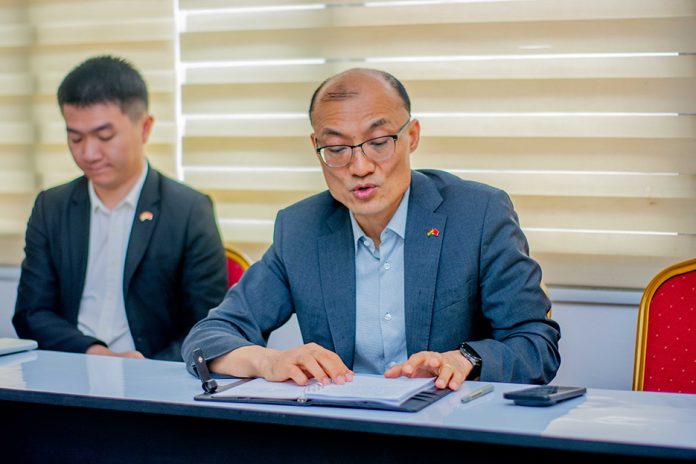In a significant show of alignment with Ghana’s development agenda, the Chinese Mission in Ghana has expressed strong support for the country’s newly launched 24-Hour Economy policy, encouraging Chinese enterprises and investors to establish manufacturing bases in Ghana.
This affirmation was made during an interactive session held on Saturday, August 2, 2025, between the Ambassador of the People’s Republic of China to Ghana, H.E. TONG Defa, and media fellows participating in the ongoing Ghana-China Media Fellowship 2025.
The engagement formed part of a broader discussion on economic cooperation, industrial transformation and sustainable development under the Ghana-China partnership.
Ghana’s 24-Hour Economy initiative, introduced by the Government of Ghana earlier this year, aims to maximize productivity, create jobs, and boost export capacity by promoting continuous business operations, particularly in key sectors like manufacturing, logistics, energy and services. The ambassador’s support signaled China’s readiness to partner in realising this vision by facilitating industrial investment and technology transfer.
H.E. TONG Defa also reaffirmed China’s commitment to its global climate responsibility by restating the country’s policy to cease funding coal power projects overseas.
The ambassador’s remarks aligned with China’s broader pledge announced by President Xi Jinping at the United Nations General Assembly in September 2021, where China committed to stop building new coal-fired power plants abroad.
This pledge marked a significant shift in global energy financing, as China had previously been one of the largest financiers of coal infrastructure worldwide, particularly through its Belt and Road Initiative (BRI).
According to research from the Global Energy Monitor and Boston University, prior to the 2021 announcement, Chinese institutions were involved in more than 70% of all coal plants under construction globally outside China.
Since the announcement, several planned coal projects have been suspended or canceled and Beijing has signaled a strategic shift toward supporting green energy and sustainable infrastructure in partner countries.
The reaffirmation by Ambassador TONG during the fellowship engagement underscores China’s continued alignment with international climate goals, including the Paris Agreement and the pursuit of carbon neutrality by 2060.
China is already one of Ghana’s top trade and investment partners. The call for more Chinese manufacturing ventures within Ghana signals potential for deeper economic integration and support for Ghana’s industrial policy objectives.
The Ghana-China Media Fellowship, spearheaded by the Africa-China Centre for Policy and Advisory (ACCPA), seeks to deepen media understanding of Ghana-China relations.
The ambassador’s visit offered fellows direct insight into how diplomacy and enterprise are jointly shaping bilateral development priorities.
As Ghana seeks to reposition itself as a competitive manufacturing and export hub in West Africa, stronger collaboration with established partners like China could prove pivotal in unlocking the full potential of the 24-hour economy.









